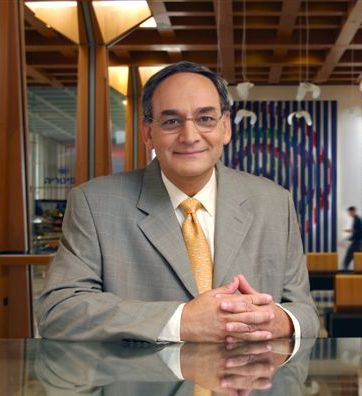Prof. Zeev Rotstein Appointed CEO of Sheba

Prof. Zeev Rotstein, has been appointed CEO and Director General of the Chaim Sheba Medical Center at Tel Hashomer in Israel. Sheba Medical Center is the largest hospital and medical research complex in the Middle East, recognized internationally for its excellence in healthcare and medical research. It cares for more than one million patients a year.
Rotstein, a cardiologist and expert in health management, has been with the Sheba Medical Center at Tel Hashomer for close to 30 years. He has served as Director of Sheba's Acute Care Hospital, as a senior cardiologist in Sheba's Heart Institute, and as acting director general of the medical center.
Prof. Rotstein trained in medicine at Tel Aviv University, and has held fellowships at the New York Department of Health, Tufts University, and Johns Hopkins Medical Center School of Hygiene and Public Health. He is an associate clinical professor in the Graduate School of Business & Administration and in the Sackler School of Medicine at Tel Aviv University, and is widely published in domestic and international medical and scientific publications.
"I know that Zeev Rotstein will lead the Sheba Medical Center to ever greater heights of excellence in treatment and medical research," said outgoing Sheba CEO Prof. Mordechai Shani, who served in the post for more than 30 years in addition to serving two terms as director general of the Israel Ministry of Health. "I will continue to work with Prof. Rotstein to help transform Sheba from a government-owned hospital into an independent non-profit corporation with a public board."
Upon his appointment, Prof. Rotstein said that "I intend to harness the clinical prowess, leading-edge medical technology and scientific leadership at Sheba in order to form international research partnerships with the best medical centers and medical entrepreneurs in the world. Twenty-five percent of all medical clinical research in Israel is conducted at Sheba, and we receive the majority of university and US-Israel bi-national research grants. As such, Sheba is well-positioned to lead the development of hi-tech medical advances in fields such as onco- and reproductive genetics, gene therapy, hemato-oncology, immunology and lipids."
Rotstein plans to raise more than $50 million over the next decade for the expansion of Sheba's Heart and Heart Research Institute, its internationally-recognized Cancer Treatment and Research Center, its leading-edge multidisciplinary Brain Research Center, for its planned Pediatric Congenital Heart Diseases Center, and for other basic and applied medical research.
Aside from being well-known in Israel for his leadership in medicine and health policy, Prof. Rotstein recently was in the news when he recruited himself to locate Israeli survivors of the Asian Tsunami. Along with her friends, Rotstein's niece, Tovi, went missing in the Andeman Islands after the swelling seas hit Asian resorts. They were all young Israelis backpacking through the region after their army service. Rotstein rented sophisticated satellite communication equipment and jumped on a plane to the Andeman Islands. For one week he traveled through the region, connecting Israeli youth with their parents in Israel using his satellite phones, searching for survivors, providing basic medical treatment, and reporting back to Israeli media. He found Tovi and her friends alive and well after 10 days of searching.
The Sheba Medical Center at Tel Hashomer is the largest medical enterprise in the Middle East. It is situated on a 150-acre campus on the outskirts of Tel Aviv, with 120 departments and clinics and 1,700 beds, employing more than 900 physicians and 5,800 healthcare workers and support staff. The medical center uniquely combines a major Acute Care Hospital with a Rehabilitation Hospital. It handles 1,117,000 outpatient visits; 107,000 inpatients; and 173,000 emergency visits annually, and conducts more than two million medical tests of all types each year, on a $320 million annual budget.
The Sheba Medical Center is the main clinical trial venue for human health scientific studies conducted by the Weizmann Institute for Science, and Tel Aviv and Bar-Ilan universities. It is a key partner with industry as an initiator, catalyst and testing center for Israeli medical technology and pharmaceutical industries. Sheba also is home to the Israel National Center for Health Policy and Epidemiology Research (equivalent to the U.S. National Institutes of Health), the internationally-acclaimed Israel National Center for Medical Simulation (MSR), the Israel National Center for Newborn Screening, and the Israel National Blood Bank and Cord Blood Bank. It serves as the teaching facility for Tel Aviv University's Sackler School of Medicine.
Israel's only pediatric hospice is located at Sheba, as is the largest and most comprehensive rehabilitation hospital, with respiratory, neurological, orthopedic, psychiatric, geriatric, MS and trauma rehab departments. Israel's first open-heart, artificial heart, and pediatric congenital heart surgeries were performed at Sheba, and Israel's first test-tube baby was born at Sheba, as well.
Sheba is one of the very few hospitals in Europe and the Middle East to have won Federal-Wide Assurance designation from the U.S. Department of Health and Human Services, making Sheba eligible for federal research grants involving human clinical trials.
This summer, Sheba dedicated its new Lily and Edmond Safra Children's Hospital, with more than 200 beds serving 8,000 in-patient admissions and 60,000 emergency room visits a year. The Safra Hospital is expected to care for over 10,000 newborn infants a year, including at least 1,200 requiring special or intensive care.
Open to patients from across Israel, the Mediterranean region, the Palestinian Authority and the Arab world, the Children's Hospital already is planning an expansion, with a $14 million Congenital Heart Diseases Center, which will encompass units in genetic research and counseling, early diagnosis of intra-uterine congenital heart defects, invasive and non-invasive cardiac surgery suites and pediatric intensive care. The hospital also plans to open a Center for the Prevention and Treatment of Child Abuse.
"This latter project is truly where my heart is," quips Prof. Rotstein. "I am committed to its advancement, and welcome the participation of visionary philanthropists and friends around the world."








